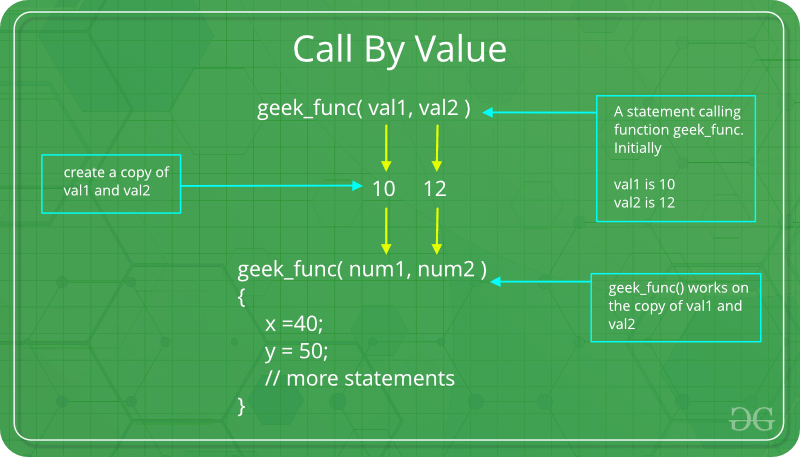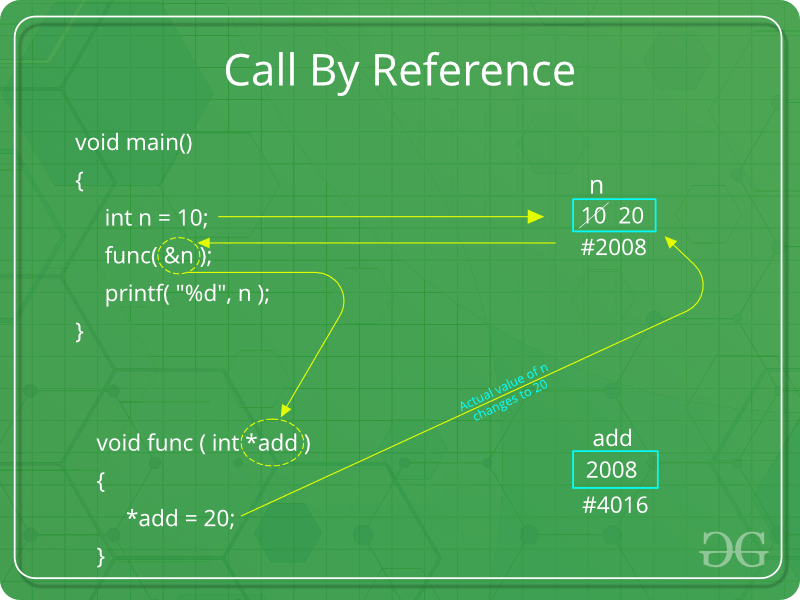Is Any Piece Of Data That Is Passed Into A Function When The Function Is Called.
Parameter Passing Techniques in C/C++
There are unlike ways in which parameter data can exist passed into and out of methods and functions. Permit us assume that a role B() is called from another function A(). In this case A is called the "caller part" and B is chosen the "called part or callee function" . Also, the arguments which A sends to B are called actual arguments and the parameters of B are called formal arguments.
Terminology
- Formal Parameter : A variable and its type equally they appear in the prototype of the function or method.
- Actual Parameter : The variable or expression corresponding to a formal parameter that appears in the function or method phone call in the calling surroundings.
- Modes:
- IN: Passes info from caller to callee.
- OUT: Callee writes values in caller.
- IN/OUT: Caller tells callee value of variable, which may be updated by callee.
Of import methods of Parameter Passing
- Pass Past Value: This method uses in-manner semantics. Changes made to formal parameter do not get transmitted back to the caller. Any modifications to the formal parameter variable inside the chosen function or method affect only the dissever storage location and will not be reflected in the bodily parameter in the calling surround. This method is also called equally call by value .

C
#include <stdio.h>voidfunc(inta,intb){a += b;printf("In func, a = %d b = %d\n", a, b);}intmaster(void){intx = five, y = 7;func(x, y);printf("In primary, x = %d y = %d\north", ten, y);return0;}CPP
#include <iostream>usingnamespacestd;voidfunc(inta,intb){a += b;cout <<"In func, a = "<< a <<" b = "<< b << endl;}intmain(void){intx = 5, y = 7;func(x, y);cout <<"In main, 10 = "<< 10 <<" y = "<< y;return0;}Output:
In func, a = 12 b = 7 In chief, x = 5 y = 7
Languages like C, C++, Java support this blazon of parameter passing. Java in fact is strictly call past value.
Shortcomings:- Inefficiency in storage resource allotment
- For objects and arrays, the copy semantics are costly
- Laissez passer by reference(aliasing): This technique uses in/out-mode semantics. Changes made to formal parameter do get transmitted dorsum to the caller through parameter passing. Any changes to the formal parameter are reflected in the actual parameter in the calling surroundings as formal parameter receives a reference (or pointer) to the actual data. This method is likewise chosen as call by reference. This method is efficient in both time and space.

C
#include <stdio.h>voidswapnum(int* i,int* j){inttemp = *i;*i = *j;*j = temp;}intmain(void){inta = 10, b = xx;swapnum(&a, &b);printf("a is %d and b is %d\due north", a, b);return0;}CPP
#include <iostream.h>usingnamespacestd;voidswapnum(int* i,int* j){inttemp = *i;*i = *j;*j = temp;}intmain(void){inta = x, b = twenty;swapnum(&a, &b);cout <<"a is "<< a <<" and b is "<< b;return0;}Output:
a is twenty and b is 10
C and C++ both back up call by value as well as phone call by reference whereas Java doesn't back up call by reference.
Shortcomings:- Many potential scenarios tin occur
- Programs are difficult to sympathize sometimes
Other methods of Parameter Passing
These techniques are older and were used in earlier programming languages like Pascal, Algol and Fortran. These techniques are non applicable in high level languages.
- Pass by Result:This method uses out-mode semantics. Just earlier control is transferred back to the caller, the value of the formal parameter is transmitted back to the actual parameter.T his method is sometimes called call by result. In general, pass by result technique is implemented by copy.
- Pass by Value-Result: This method uses in/out-manner semantics. Information technology is a combination of Pass-by-Value and Pass-by-result. Just before the control is transferred back to the caller, the value of the formal parameter is transmitted back to the actual parameter. This method is sometimes called as call by value-result
- Pass by name : This technique is used in programming language such every bit Algol . In this technique, symbolic "proper noun" of a variable is passed, which allows it both to be accessed and update.
Instance:
To double the value of C[j], you lot can laissez passer its name (non its value) into the following process.procedure double(x); real x; brainstorm x:=10*2 terminate;
In full general, the effect of laissez passer-past-name is to textually substitute the argument in a process telephone call for the corresponding parameter in the body of the procedure.
Implications of Pass-by-Name mechanism:- The argument expression is re-evaluated each time the formal parameter is passed.
- The procedure tin change the values of variables used in the argument expression and hence alter the expression'due south value.
Is Any Piece Of Data That Is Passed Into A Function When The Function Is Called.,
Source: https://www.geeksforgeeks.org/parameter-passing-techniques-in-c-cpp/
Posted by: mckinneyfaily1958.blogspot.com


0 Response to "Is Any Piece Of Data That Is Passed Into A Function When The Function Is Called."
Post a Comment